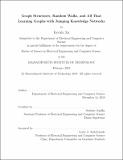Graph structures, random walks, and all that : learning graphs with jumping knowledge networks
Author(s)
Xu, Keyulu.
Download1102051218-MIT.pdf (3.394Mb)
Alternative title
Learning graphs with jumping knowledge networks
Other Contributors
Massachusetts Institute of Technology. Department of Electrical Engineering and Computer Science.
Advisor
Stefanie Jegelka.
Terms of use
Metadata
Show full item recordAbstract
Graph representation learning aims to extract high-level features from the graph structures and node features, in order to make predictions about the nodes and the graphs. Applications include predicting chemical properties of drugs, community detection in social networks, and modeling interactions in physical systems. Recent deep learning approaches for graph representation learning, namely Graph Neural Networks (GNNs), follow a neighborhood aggregation procedure, where the representation vector of a node is computed by recursively aggregating and transforming feature vectors of its neighboring nodes. We analyze some important properties of these models, and propose a strategy to overcome the limitations. In particular, the range of neighboring nodes that a node's representation draws from strongly depends on the graph structure, analogous to the spread of a random walk. To adapt to local neighborhood properties and tasks, we explore an architecture - jumping knowledge (JK) networks that flexibly leverages, for each node, different neighborhood ranges to enable better structure-aware representation. In a number of experiments on social, bioinformatics and citation networks, we demonstrate that our model achieves state-of-the-art performance. Furthermore, combining the JK framework with models like Graph Convolutional Networks, GraphSAGE and Graph Attention Networks consistently improves those models' performance.
Description
This electronic version was submitted by the student author. The certified thesis is available in the Institute Archives and Special Collections. Thesis: S.M., Massachusetts Institute of Technology, Department of Electrical Engineering and Computer Science, 2019 Cataloged from student-submitted PDF version of thesis. Includes bibliographical references (pages 51-54).
Date issued
2019Department
Massachusetts Institute of Technology. Department of Electrical Engineering and Computer SciencePublisher
Massachusetts Institute of Technology
Keywords
Electrical Engineering and Computer Science.